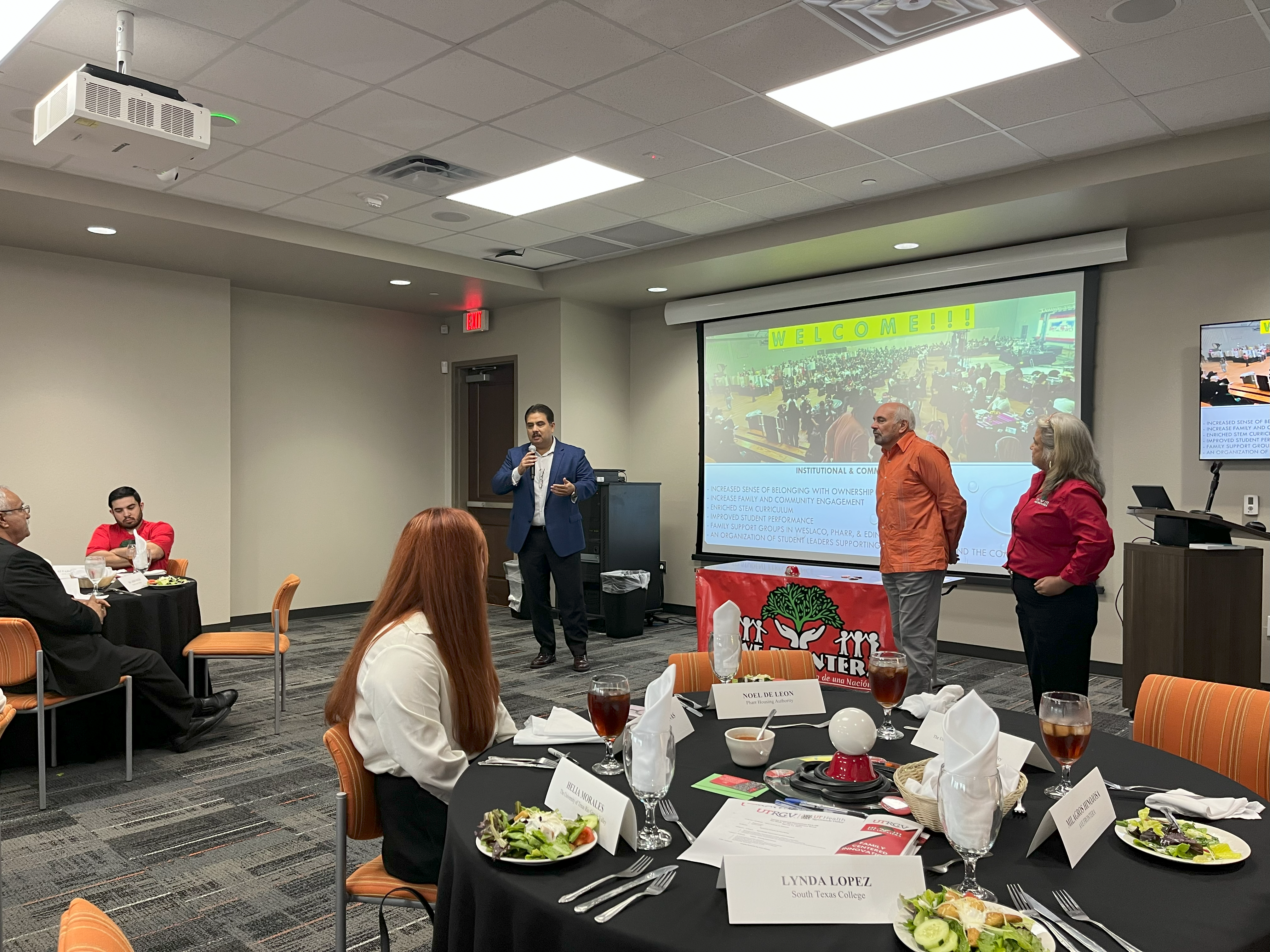Through a NSF grant, UTRGV will collaborate with AVE Frontera and STC to expand the Family Centered Pedagogy course style to more families in the Rio Grande Valley. (UTRGV Photo)
Tuesday, October 1, 2024
Education & Training, Research, Community
By Karen Villarreal
RIO GRANDE VALLEY, TEXAS – OCT. 1, 2024 – Through the Family Integrated Education: Serving and Transforming Academia (FIESTA) program at UTRGV, primarily first-generation college students are able to find community connections on their university campus along with support at home by bringing their families into a project.
In this case, the project is Family Centered Pedagogy (FCP), which helps the students connect their family history, their parents’ careers, and shared personal interests to STEM concepts.
The UTRGV community collaboration now is expanding to South Texas College (STC) starting in Fall 2024, with the support of the City of Pharr and the Pharr Housing Authority. The expansion was announced recently at a Family Centered Innovations Kickoff event by representatives of the FIESTA program and community partner AVE Frontera.
Since the FCP initiative was funded at UTRGV by a National Science Foundation grant in 2021, the program has grown to train 42 UTRGV faculty who reach hundreds of students with FCP courses each semester.
UTRGV President Guy Bailey said the partnership has a common purpose: to get students into STEM and graduated, via the mechanism of family support.
“That family support gets you through when you deal with those really hard courses,” Bailey said. “Family-centered innovative teaching – the pedagogy that’s developed here – has the possibility to transform universities in a lot of the United States. We’ll transform individual students’ lives, their families. We’ll transform the entire RGV.”
Fourteen UTRGV faculty, the FCP students, and AVE Frontera family leaders began working with STC students and faculty this summer to develop family centered projects for Fall 2024.
FINDING A HOME ON CAMPUS
Juan Salinas Jr., co-founder of AVE Frontera and principal investigator on the Family Centered Innovations grant, said students’ families and “family leaders” from AVE Frontera, a community advocacy group, are a crucial part of this “institutional transformation project.”
AVE Frontera family leaders visit each FCP class twice over the semester to encourage students and assist in integrating their families into projects in their introductory chemistry, biology, environmental science, mathematics, engineering, computer science, astronomy, and physics courses.
“Families present their knowledge, provide support and give constructive feedback to the students,” he said.

Virginia Santana, president of AVE Frontera, said the families feel proud to be on the UTRGV campus, sharing their lived experiences with the students.
“When we visit, we feel like we belong here. We feel we have something to share,” she said. “Maybe we don’t have the formal education, but we share our stories and values with our hearts.”
Bailey said UTRGV, as a public university, literally belongs to them.
“It’s your home,” he said. “You’re always welcome here.”
ALAS TAKES FLIGHT
Some of the FCP students who felt they benefitted greatly from AVE Frontera’s involvement decided to start a student chapter of the organization at UTRGV, as a way to give back to other students in similar situations.
“I’m not the only student here who struggles with English as a second language, or whose family is in Mexico and we’re on our own here,” said Shiela Cardenas, president of the new student group, ALAS: Association of Leaders Advancing Servingness.
“When you can’t get home and talk to anyone about how hard it’s going in school, AVE Frontera was there to give us an encouraging word. The motivation they gave me, I want to pay it forward.”
The club is just a year old and is still organizing and recruiting to grow from their current 15 members. Participation in the Family Centered Innovations is their first project.
“They provide mentorship and help undergraduate first-generation students in getting acclimated to life on campus,” said Dr. Jose J. Gutierrez, professor in the UTRGV School of Integrative Biological and Chemical Sciences, who serves as the ALAS faculty advisor. “They aim to provide support to all who may be experiencing marginalization through this critical transition that could hinder their sense of belonging.”
ABOUT UTRGV
The University of Texas Rio Grande Valley (UTRGV) was created by the Texas Legislature in 2013 as the first major public university of the 21st century in Texas. This transformative initiative provided the opportunity to expand educational opportunities in the Rio Grande Valley, including a new School of Medicine and a School of Podiatry, and made it possible for residents of the region to benefit from the Permanent University Fund – a public endowment contributing support to the University of Texas System and other institutions.
UTRGV has campuses and off-campus research and teaching sites throughout the Rio Grande Valley including Brownsville (formerly The University of Texas at Brownsville campus), Edinburg (formerly The University of Texas-Pan American campus), Harlingen, Weslaco, McAllen, Port Isabel, Rio Grande City and South Padre Island. UTRGV, a comprehensive academic institution, enrolled its first class in the fall of 2015; the School of Medicine welcomed its first class in the summer of 2016, and the School of Podiatric Medicine in the fall of 2022.
